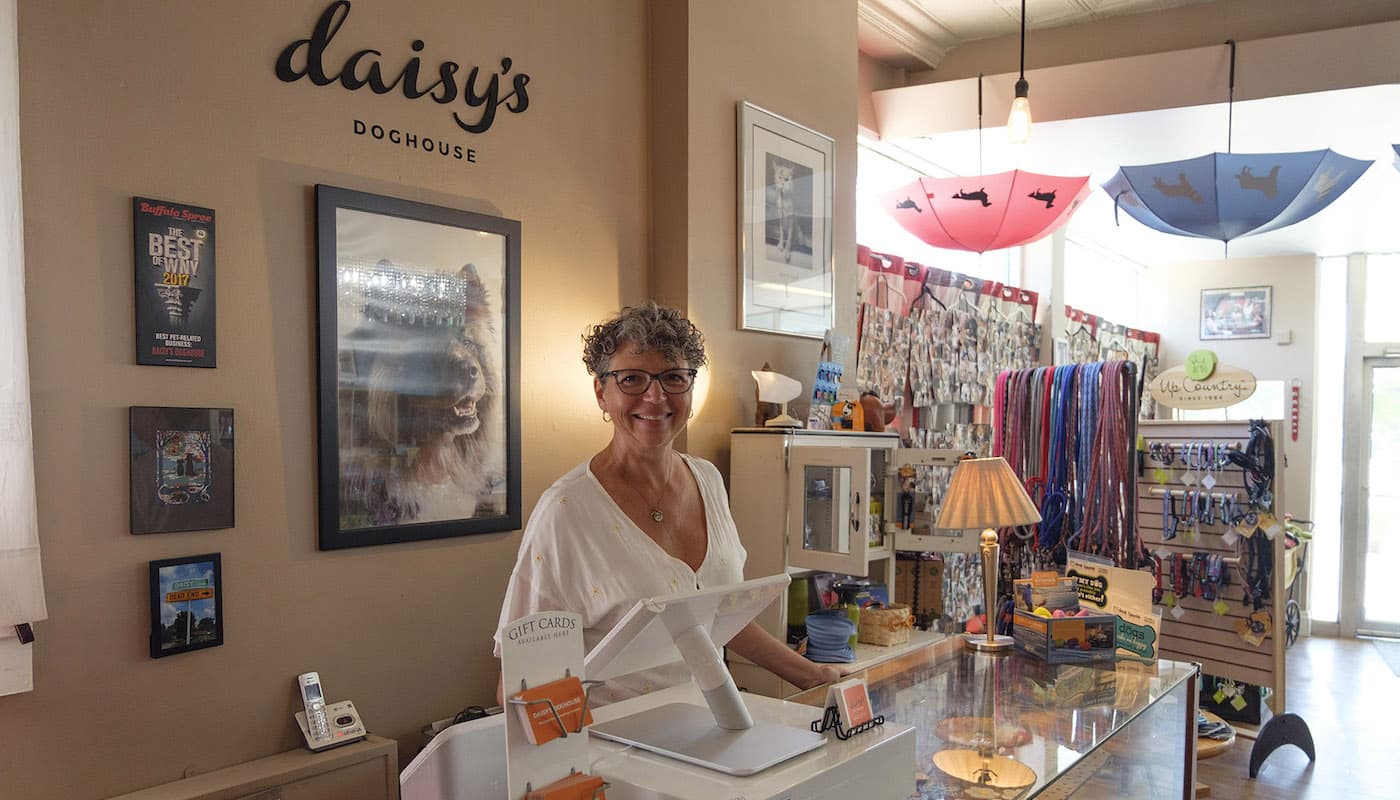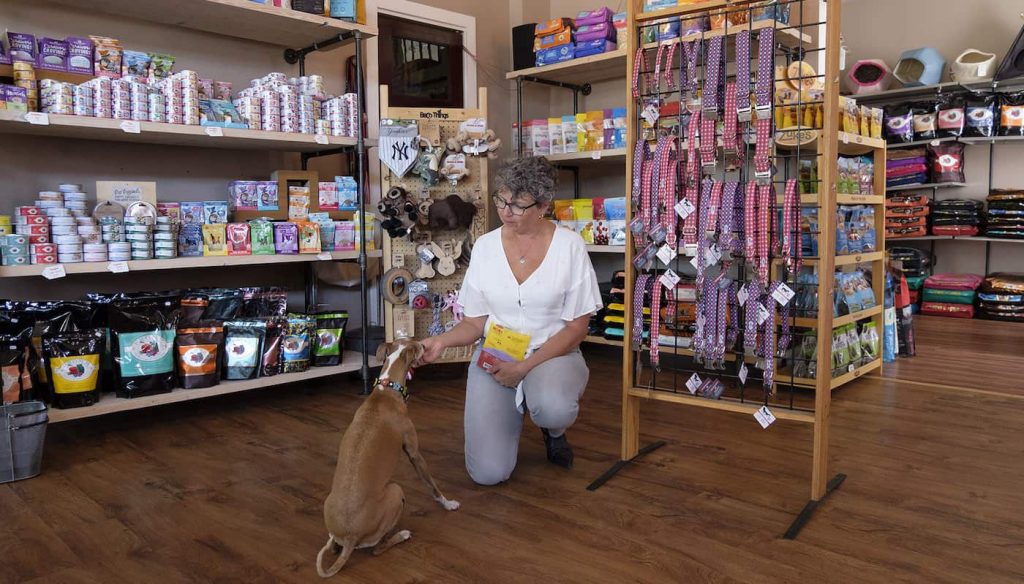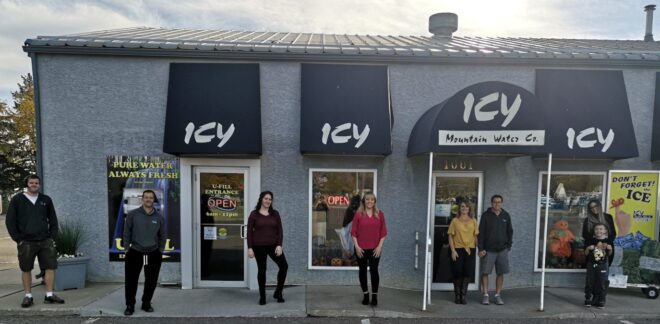Daisy’s Doghouse
Editorial Team
11 min read
In this installment of our Meet the Merchant series, we talk to Lisa Samar, owner of Daisy’s Doghouse in Buffalo, NY. Daisy’s Doghouse is a boutique-style shop that Lisa fills with beautiful items for her four-legged customers. Lisa talks about what inspired her to change careers and open her own shop, and how she has strived to make Daisy’s a beacon of normalcy during trying times.
Clover: Hi, Lisa! Can you tell us how you came to open Daisy’s Doghouse?
Lisa Samar: It started as an idea I wrote down in a notebook years ago. I worked at a local greeting card manufacturer, a great company called Great Arrow Graphics, for 25 years. I was the vice president and art director. But I had always wanted to start my own business. So when my kids were almost out of college, I returned to this idea I had in my notebook. I have been a businessperson my whole life, but on the manufacturing side—I knew nothing at all about pet retail. I was constantly on the lookout for a location in my neighborhood, because I know that retail is about where you are, especially in the city. When this one little flower shop on the corner became available, I said to my husband, “I think this is the time. We’ve got to do this if we’re going to do it.” I had a beautiful dog named Daisy, so that’s where the name came from.
Once we agreed on the lease, I learned a lot. I had a vision that I had wanted the store to be a boutique, a nice place to shop for pet supplies as opposed to going to a big retailer. They’re great stores and have good resources, but I wanted Daisy’s Doghouse to be a unique community experience. We’ve been open five years, and it’s become just that. It’s so incredibly rewarding.
Clover: What differentiates Daisy’s Doghouse from your typical retail pet shop?
Samar: I designed the store as a place where it feels like you’re walking into my living room, only it’s filled with dog toys and treats and food, plus some cat things, too. We’ve made the shop into an experience. We try to make it so people who come in have a really good time and want to come back again. The first time someone comes to the store, we take a picture of their dog. My walls now are lined with all the neighborhood dogs—I mean thousands of pictures. People will come back just to look for the picture of their dog. Recently, I had a little boy come in whose dog passed away, and he knew exactly where his dog was on the wall. It was hugely meaningful for him. He said, “Oh, my God, there he is,” and started crying.
It’s grown into a place where we know everybody, and they know my employees. It’s warm and welcoming, and a different experience than going to pretty much any other retail space. We make sure people feel acknowledged when they come in the store, but we aren’t pushy about sales. It’s all leisurely shopping like you’re in a boutique, only it’s filled with things for your pets. I think that atmosphere makes a huge difference. On top of that, we’re in the heart of North Buffalo, which is a walking community, and we’re right near a park. So it’s a place where families like to come in and socialize, maybe have a drink with me if there’s wine open.
Clover: How did you develop your customer base?
Samar: I think they’ve really found us organically. As I mentioned, it’s a walking neighborhood, so people started coming in as soon as they realized that we’re a pet store. Buffalonians are a little bit territorial about where they live and they welcome everybody that opens—as long as store owners are nice. They’re excited to have something like Daisy’s Doghouse on their corner, in their neighborhood. I feel like we have won people over.
I have not been very aggressive about marketing, or spent a lot of money on it. I do one post a day on Instagram and Facebook. I don’t do a ton of sales pitches once people come into the store, either. Sometimes it takes me a year to sell a bag of dog food to someone, but then they keep coming back. It’s also word of mouth. Our business has grown every year we’ve been open. Last year was 15% more profitable than the year before, which is big for us. This year we’re already on pace to top that. We are very consistent.
We’re also open every day of the week, which is unusual for any business around here if you’re not a big-box store. We’re there when we say we’ll be there. There’s no sign on the door that says, “Oh, we’re closed today because it’s a beautiful beach day.” I consider myself a service. Even though we are a boutique store, we do serve our community. I feel like we should be open all the time, so we are.
Clover: How did you find your employees? Did you get a feel for how they’d interact with pets who come in the store?
Samar: There are two other women who work with me, both of whom I met through the store, actually. They were customers of mine, and they both love dogs as much as I do. Because when a dog comes in, we’ve got to gush over that dog. It’s about the animal that’s in the store, not necessarily my dog. A lot of people ask me why Daisy wasn’t in the store all the time before she passed. At some point I realized that the store is named after her, but it wasn’t about her. It’s about my customers’ dogs and what they need. It’s like people with a new baby, they just want to show their animals off! We get on the floor with the dogs and give them treats until they won’t eat any more.
I hired hundreds of employees at my previous company, so had a sense of how to find the right people for my team. They’re great and they enjoy what they do, you can tell through the interactions they have with customers. People like them. I’ve been very lucky on this adventure.

Clover: What qualities do you look for in the products you sell in your store?
Samar: When I first opened, I had this idyllic vision of only selling products made in the United States. And as much as I can possibly find is made in the U.S. I love beautiful design and products have to be super high quality. I buy things that I would like to have in my home. Over the years, I’ve come to know that I need to have high-end stuff, but also items that are worth people’s dime. I want everyone on the team to know what we’re selling and where it’s made. And I want products that can be displayed in a pretty way.
Now, I do have ugly things in the store, like bully sticks and treats that aren’t so great looking. But for the most part, our products have to be something I would buy for my dogs or as a gift to give to somebody. That’s how I try to select what we sell. I also try to find things that other places don’t necessarily have. One example is Bessie and Barnie, a company that makes these gorgeous beds. It’s a veterans with disabilities-owned company down in Florida. People have to understand that if they want to buy products made in the U.S., they’re a little more expensive. But for me, the product has to look like it matches the price.
Clover: How did you decide on Clover as your point-of-sale system, and how do you use it?
Samar: It was recommended to me by a neighboring restaurant owner before I left my previous job. I was in a hurry to get everything together, I only had a six-month window, so I just went on her recommendation. It has been awesome. I’ve only had one issue in five years. I’m reaching the point where I’m wondering if I’ll need to update and how long they really last. But we use it every day. It’s been a great choice.
We use it most often for processing payments. I keep track of all my inventory with Clover. I also use it to run all the numbers when I commission local artists we work with. I use the Happy Hour app when I’m running a sale. So if I have a toy sale going on from Friday to Sunday, I just put in the hours and the percentage, which items are on sale, and Clover takes it off automatically when you scan the item. We also use the Gift Card app, and sell maybe a few a week.
Clover: How has the pandemic affected your business?
Samar: We were deemed an essential business because we sell dog food, so we stayed open. My team knows how I feel about being there for our customers, so we stayed open and we’ve been healthy. We do follow CDC guidelines. We only allow a certain amount of people in the store, and pretty much everyone wears a mask when they come in. We do a lot of cleaning at all touch points, including our Clover devices, counter tops, door handles, and other places that people are touching a lot, they all get wiped down often.
Back when everybody went into crazy toilet-paper-buying mode, they wanted to do the same with dog food, which was shocking to me. I had to talk people down and say, “Please do not buy all the dog food, because then I won’t have any for other people. I will be able to get it, I’m not going to close.” There was a lot of comforting people, and telling them we’re going to be around.
We also helped out other businesses in the neighborhood. Since we were one of the only places open on our block that wasn’t a restaurant offering take out, we served as the pickup point for my friends’ shops in the area. Like the store next door to us sells clothing, so if she sold something online, their customers had a choice to either have it delivered or pick it up at Daisy’s.
We tried to make our shop a place of normalcy. Things are loosening up a little bit here now, but for a while, we would be the only place people could go. They had to get dog food, but they’d linger because they hadn’t been out. They’ve been with their kids, they’ve been working from home, and they haven’t had a place to shop, so we were that place. Other than the craziness at the beginning, it’s been sort of normal in our store.
Clover: What advice do you have for other small business owners?
Samar: What I’ve learned over the past few years is to know what you don’t know, and do the best you can to find answers for people. I’m one brick-and-mortar store, and sometimes I really have to remind myself to stay in my lane. Be willing to be open to change, but really make sure you’re doing what you do well. Every time I thought, oh, maybe I should add grooming or a dog wash to my store, I reel myself in. I’ve seen a lot of people try to do too much outside of what made them successful, it doesn’t always help.
Stay the course and be consistent. I think consistency has been the best thing my store has going. We’re consistently nice, we love your dogs, we’re always open. Customers are (95% of the time) always right. I’m always telling my team, “We want it to be pretty, we want things to sparkle, we want the shop to be a place where people feel welcome.” I’ve been staying the course for five years. That’s what I started with, and that’s where we are now, and it’s worked.
Read more of our Meet the Merchant stories for real-life stories of small businesses in action all over the country.
Related Posts
5 ways Clover POS systems support medical businesses
Icy Mountain Water
Popular Topics
Stay In Touch
Sign up and learn more about Clover.
Thank you for your subscription!
Recent Stories
- Jewelry store supplies and equipment needed for opening day
- How small businesses can use employee discounts to retain staff
- Tips and tricks for opening an outdoor pop-up restaurant
Please share your contact information
to access our premium content.
Thank you for sharing your contact information.
Download Now





